 Petzlover
Petzlover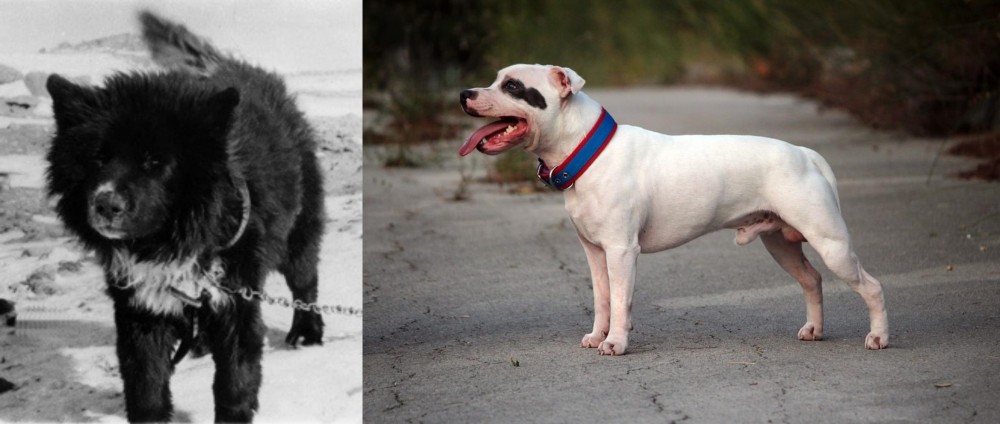 Sakhalin Husky is originated from Japan but Staffordshire Bull Terrier is originated from United Kingdom. Sakhalin Husky may grow 25 cm / 10 inches higher than Staffordshire Bull Terrier. Sakhalin Husky may weigh 23 kg / 51 pounds more than Staffordshire Bull Terrier. Both Sakhalin Husky and Staffordshire Bull Terrier has almost same life span. Both Sakhalin Husky and Staffordshire Bull Terrier has almost same litter size. Sakhalin Husky requires Moderate Maintenance. But Staffordshire Bull Terrier requires Low Maintenance
Sakhalin Husky is originated from Japan but Staffordshire Bull Terrier is originated from United Kingdom. Sakhalin Husky may grow 25 cm / 10 inches higher than Staffordshire Bull Terrier. Sakhalin Husky may weigh 23 kg / 51 pounds more than Staffordshire Bull Terrier. Both Sakhalin Husky and Staffordshire Bull Terrier has almost same life span. Both Sakhalin Husky and Staffordshire Bull Terrier has almost same litter size. Sakhalin Husky requires Moderate Maintenance. But Staffordshire Bull Terrier requires Low Maintenance
 Known also as the Karafuto-Ken, the Sakhalin Husky is a dog that has been used as a sled dog, but which is now almost extinct.
Known also as the Karafuto-Ken, the Sakhalin Husky is a dog that has been used as a sled dog, but which is now almost extinct.
Hailing from Japan, it is believed that in 2011, there were only two surviving members of the breed in Japan. There isn’t much history on these dogs, but we do know that it is an old breed. They've been used by explorers to the South Pole. One such explorer was Robert Falcon Scott.
They’re extremely tough dogs, known for enduring in the snow under extreme conditions. The dog breed isn’t recognized as a standardized breed by any of the major kennel clubs.
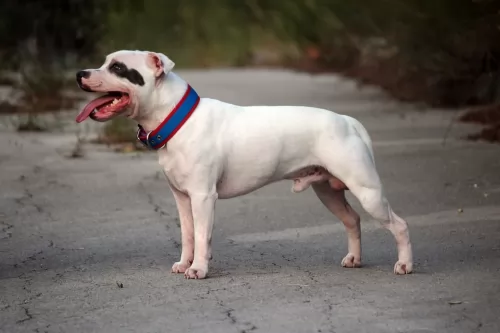 The Staffordshire Bull Terrier was first developed in the northern sections of Birmingham and in Staffordshire, England. The Staffie is a cross between a Black and Tan Terrie and the Bulldog, but had other breeds crossed in over time in order to create a bull-baiting dog and a fighting dog. In the Victorian age these sports were banned but dog fighting went underground and continues on some level today.
The Staffordshire Bull Terrier was first developed in the northern sections of Birmingham and in Staffordshire, England. The Staffie is a cross between a Black and Tan Terrie and the Bulldog, but had other breeds crossed in over time in order to create a bull-baiting dog and a fighting dog. In the Victorian age these sports were banned but dog fighting went underground and continues on some level today.
The Staffordshire Bull Terrier was exceptional at these “sports” due to his build, power and jaw strength. Today’s Staffie is a descendent of those early Bull Terrier crosses. Together with the Bull Terrier and the American Pit Bull, the Staffie also traces its roots back to those original English Bully dogs. All three breeds have the Bulldog in common.
After dog fighting and bull baiting were banned the Stafforshire Bull Terrier was further developed as a companion and pet. Still their reputation as fighting dogs cost them recognition in the official kennel clubs for some time. They finally made the UK registry in 1935, but it was not until 1974 that the American Kennel Club (AKC) accepted them.
 This is a medium sized dog standing at between 56 and 66cm in height and weighing between 30 and 40kg. His coat is thick and can be in a number of colours such as brown, tan, cream, grey or black. The ears are small and pointed and slightly tilted forwards. The tail is long and sometimes curls over the back while at other times it is held straight or down.
This is a medium sized dog standing at between 56 and 66cm in height and weighing between 30 and 40kg. His coat is thick and can be in a number of colours such as brown, tan, cream, grey or black. The ears are small and pointed and slightly tilted forwards. The tail is long and sometimes curls over the back while at other times it is held straight or down.
These dogs are known for their loyalty, affection and bravery. The dog is highly intelligent and will respond well to training and socialization.
It's a rare dog breed, calm and confident. A perfect example of their amazing characteristics is seen in the film ‘Eight Below’ where these wonderful dogs were left behind on a scientific expedition that went wrong.
The dogs had to struggle for survival in the frozen wilderness. The Sakhalin Husky just wants to please, and is alert and intelligent, doing well in a family where there are children.
Statues have been erected to honor these Sakhalin Huskies who died on some of these ill-fated expeditions.
These dogs are totally devoted to their owners and they’re full of confidence, they’ve got immense strength and they need a lot of physical stimulation every day.
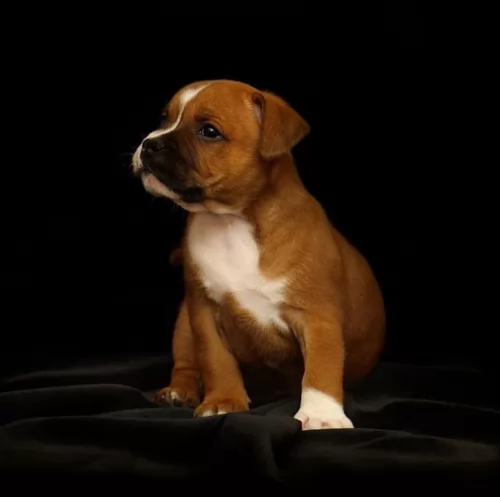 The Staffordshire is a muscular, stocky and unusually strong breed, small to medium size in height and build. They have broad, powerful chests, wide set, strong legs, strong shoulders, broad head with a fairly short muzzle. Their ears are not cropped but they are short and fold over. The coat is stiff, close and short and the tail is medium and carried low. Most Staffies are brown, but they can be red, brindle with white, fawn, black, white or blue.
The Staffordshire is a muscular, stocky and unusually strong breed, small to medium size in height and build. They have broad, powerful chests, wide set, strong legs, strong shoulders, broad head with a fairly short muzzle. Their ears are not cropped but they are short and fold over. The coat is stiff, close and short and the tail is medium and carried low. Most Staffies are brown, but they can be red, brindle with white, fawn, black, white or blue.
 When you bring these dogs into your home, you’re bringing in lots of excellent characteristics.
When you bring these dogs into your home, you’re bringing in lots of excellent characteristics.
He is loyal, affectionate and smart. With his above average intelligence, you can easily train him. He is also a playful breed and the kids will enjoy him as a good playmate.
They’re gentle dogs too and will do well in a home where people are fair, patient, kind and consistent with their handling of him. Known to be an excellent therapy dog, having this dog in your home will enhance your quality of life.
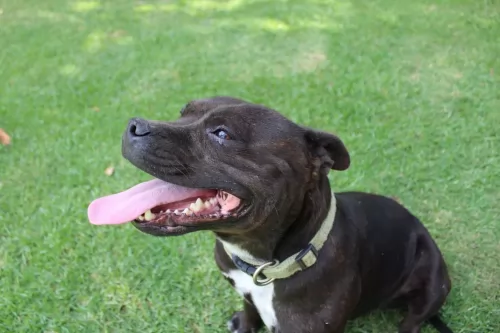 1.Children friendliness The breed adores children but care should still be taken because they are so strong and their jaws are so powerful.
1.Children friendliness The breed adores children but care should still be taken because they are so strong and their jaws are so powerful.
2.Special talents they adore children and they one of the most powerful jaws among canines.
 The brave Sakhalin Husky can live to be between 12 and 14 years of age but these dogs can succumb to quite a few of the common dog diseases there are -
The brave Sakhalin Husky can live to be between 12 and 14 years of age but these dogs can succumb to quite a few of the common dog diseases there are -
This is a hereditary disease of the cornea. You’ll see small white dots in his cornea and the dog can experience hazy vision.
This problem with the hips can be debilitating for your sled dog, and both hips can be affected. It can be painful for your dog as arthritis sets in. It is important to see that your dogs don’t put on weight as this puts pressure on the joints. Your dog will need to see the vet, and surgery might be a treatment option.
This is a condition that affects Huskies between 3 and 4 months of age and can result in hair loss or problems with the skin. It is actually fairly rare in dogs and diagnosed by microscopic examination of the hair shaft. You will need to get your pet to the vet because it can lead to alopecia.
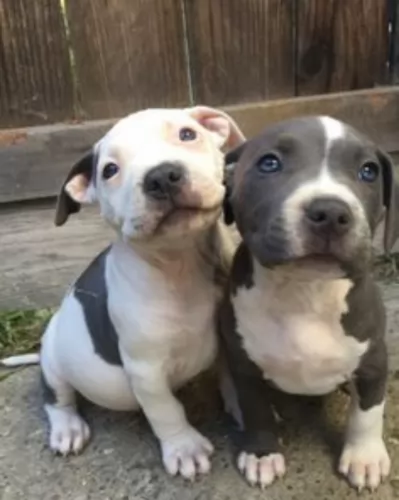 • Patella luxation otherwise known as a slipped kneecap- can cause pain and some lameness.
• Patella luxation otherwise known as a slipped kneecap- can cause pain and some lameness.
• Skin allergies and even a tendency toward Mange which is chronic in some forms and fatal in others.
• Like most active dogs their size, they are susceptible to bloat which can be fatal if not treated immediately.
 Feed your Sakhalin Husky a commercially manufactured dog formula that caters to his energy and digestive needs.
Feed your Sakhalin Husky a commercially manufactured dog formula that caters to his energy and digestive needs.
Choose high-quality dog food with natural ingredients. Try and include some home-made food into your dogs diet. Boiled chicken, brown rice or pasta, sweet potatoes, carrots and spinach will do him wonders and you can chop it up and add some into the dry kibble as a treat twice a week.
Some raw meat occasionally is also important to prevent skin problems. Be sure that cool, fresh water is available for your pet at all times.
This will require regular exercise. Walks are always good, but he will require something more hectic such as long hikes and frisbee or ball throwing games.
A Husky’s dense double-coat must be brushed at least twice a week as he is a fairly heavy shedder.
His nails grow quickly and these will need to be trimmed. Even though he has erect ears, you will need to check inside for cleanliness to avoid canine ear infections.
Check inside his mouth as well for bad teeth as these can have a detrimental affect on his health
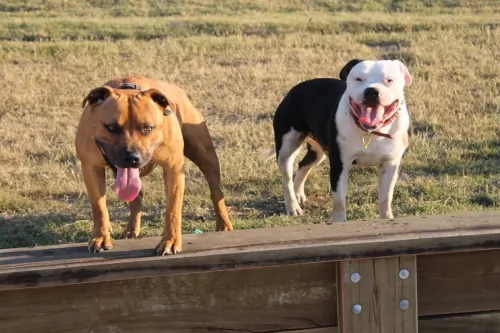 1.Feeding the puppy Don’t over feed as he grows fast. Feed a high quality dog food for medium size puppies. Feed 1-2 and a quarter cups in 3-4 meals per day.
1.Feeding the puppy Don’t over feed as he grows fast. Feed a high quality dog food for medium size puppies. Feed 1-2 and a quarter cups in 3-4 meals per day.
2.Feeding the adult Don’t exercise right before or after eating due to potential for bloat. Feed 1-2 times a day a high quality medium breed dog food.
4. Games and Exercises They are terriers after all and they dig. Need a fairly large yard with a strong fence. They love to play ball, frisbee and can excel at cart pulling.